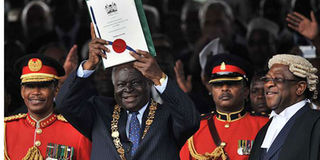Call ‘Kamukunji’ on Constitution

Former President Mwai Kibaki lifts Kenya's constitution after it was promulgated at Uhuru Park in Nairobi on August 27, 2010.
Halfway through President Mwai Kibaki’s first term, major differences were emerging within the Narc coalition government over the shape of the proposed new constitution. That was when I happened to meet up with Millie Odhiambo, then a prominent civil society activist, at some diplomatic soiree.
Over the polite cocktail chitchat, canapes and wine, Ms Odhiambo, a firm ally of key coalition leader Raila Odinga, let out that she was flustered over a gathering in Naivasha of MPs and Cabinet ministers allied to President Kibaki. Somewhere in between the shrimp sandwiches and some German mutura, word filtered in from Naivasha that the Kibaki allies were amending the draft constitution to provide for the post of a powerful Prime Minister who would be Head of Government, relegating the President to a largely ceremonial role as Head of State.
Ms Odhiambo, now one of the longest-serving Members of Parliament, was furious. What irked her was not the proposed changes but that the Kibaki allies were adopting the position long pushed by Mr Odinga. “They are stealing our idea!” she thundered, furiously working her phone as the Raila camp mobilised for a counter-offensive.
When I suggested that Mr Odinga should be proclaiming victory as the Kibaki team had finally relented in adopting the idea of an executive Premier, she would hear none of it, promising strong resistance to the proposals coming from Naivasha.
I had by then been in journalism for many years but rarely had I experienced at such close quarters the crass hypocrisy of Kenyan politics. And now, we are seeing more of the same in the puzzling push by President William Ruto’s government for a raft of constitutional amendments that, among other proposals, would entrench the post of Opposition Leader.
For most of the second half of the Jubilee administration, Dr Ruto, then Deputy President, spent plenty of energy and resources overtly and covertly fighting the Building Bridges Initiative (BBI) constitutional amendments championed by then-President Uhuru Kenyatta and opposition chief Odinga.
He fulminated against “mutilation” of the Constitution in changes designed to “create positions for individuals” and railed against proposals that ignored the interests of ordinary people and would only cause additional economic burdens.
Contain a sweetener
President Ruto has hardly exhausted his honeymoon but is already doing exactly what he fought so hard against. Even though they contain a sweetener for Mr Odinga in institutionalising the Office of Leader of the Opposition, the constitutional amendments pushed by the Kenya Kwanza regime militate against the very principle espoused in fighting the BBI proposals: Creating offices for individuals.
Even without going into the details, it is clear that the Ruto Amendments flout many other principles, especially around public participation and the sanctity of the basic structure of the Constitution.
This is not to say that the Constitution cannot be amended. Nay. The document itself contains precise modalities on how it can be changed, whether the proposals come from the Executive, or the Legislature by popular (public) initiatives.
The courts, all the way up to the Supreme Court, threw out BBI principally because the sponsors, President Kenyatta and Mr Odinga, had ignored important safeguards built in to protect the Constitution from self-serving changes that might not serve the wider public interest.
President Ruto, who celebrated the fall of BBI, might be making exactly the same mistake. What he must do is withdraw the proposed amendments and, instead, call for a national conversation about them.
I have long argued that 10 years and more is the perfect time to review the 2010 constitution, a great document in my view but one that needs a bit of polishing.
We all know that 2010 was a constitutional moment that called for the passage of what was on the table even though it was not perfect. Rejecting it at that time would have been like turning down Independence in 1963 because we were not quite ready for self-rule or opting to remain a one-party dictatorship in 1992 since the constitutional framework wasn’t perfect.
What President Ruto should do is call a national ‘Kamukunji’—a ‘Kenya we Want’ conference involving the political classes, civil society, trade unions, professional associations, religious leaders, cultural organisations and all other stakeholders—for frank and open discourse on what ails Kenya and how it can be fixed.
Only after such an engagement can we determine the nature of constitutional amendments required, if at all, and any other structural and administrative measures needed to build a cohesive, united democracy. Any solo government initiative before then should be rejected with the contempt it deserves.
[email protected]; www.gaitho.co.ke. @MachariaGaitho





